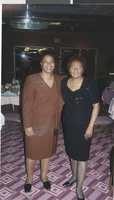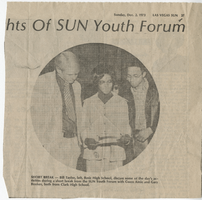Search the Special Collections and Archives Portal
Search Results





Gloria Dixon oral history interview
Identifier
Abstract
Oral history interview with Gloria Dixon conducted by Claytee D. White on May 2, 2022 for the African Americans in Las Vegas: A Collaborative Oral History Project. In this interview, Dixon recalls her childhood growing up in Las Vegas, Nevada. Dixon attended St. Christopher and Bishop Gorman High School, and recalls her parents' involvement in the New Jerusalem Church. Dixon discusses writing grants to help with community education programs, and using her experience as a hospice nurse for the last thirty years to help communicate information about public health crises. Throughout the interview, Dixon shares information about the businesses in the Las Vegas Black community on Jackson Street.
Archival Collection

MS-00102 Ruby Amie-Pilot Papers. Box 1, Folder 1: Photographs
Date
Archival Collection
Description
Box 1, Folder 1: Photographs.
Image

MS-00102 Ruby Amie-Pilot Papers. Box 1, Folder 4: Newspaper clippings, 1963 - 1991
Date
Archival Collection
Description
Box 1, Folder 4: Newspaper Clippings.
Text
